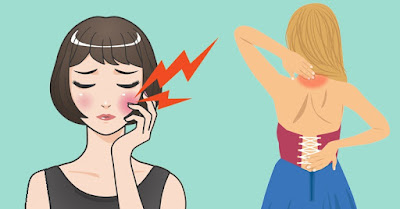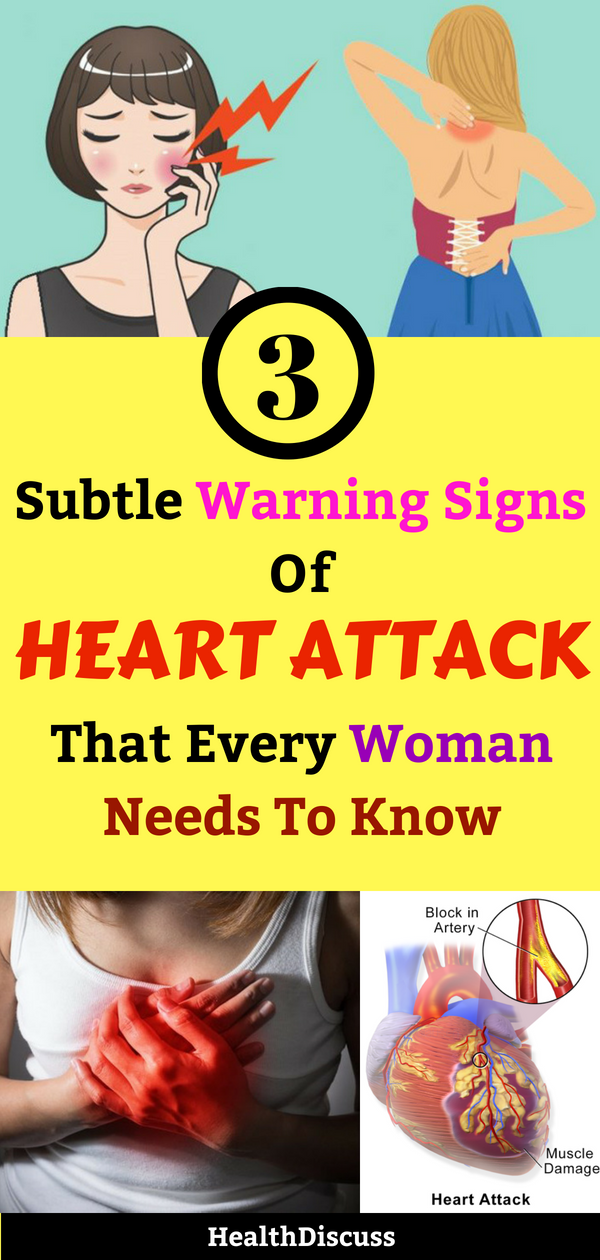Hidden Signs of Heart Attack in Women
Women are at higher chance of dying from a heart attack, compared to all forms of cancer? What`s more, more women die from heart disease than men.
However, most people are not familiar with these facts, and heart disease is being perceived as “man`s” problem. Hence, this lack of awareness puts women at higher risk for heart disease and premature death.
Heart Disease Facts and Figures
What is a heart attack?
When a certain area of the heart lacks oxygen, a heart attack occurs. Obstruction caused by plague in the coronary arteries is the most common cause of heart attack, as the coronary arteries are in charge of carrying both oxygen and nutrients to the heart.
Sudden or new fatigue is a matter of concern. Any feeling of heaviness in the chest followed by fatigue could be an early sign, too.
2. Sweating and Shortness of Breath
If sweating and shortness of breath persist while resting or after an exercise, you need to get checked up. In case they are accompanied with symptoms like chest pain, consult a doctor as soon as possible.
3. Pain in Areas Other Than the Chest
Pain indicates that there is something wrong, but it doesn’t necessarily point to the exact location of the root problem. Back pain, pain in the arm, or jaw pain often indicate a heart attack.
Symptoms Common To Women at the Time of a Heart Attack
9 Tips to Reduce Your Risk of Heart Attack
1. Tame the inflammation with Curcumin
Excessive inflammation is linked to an increased risk of coronary artery disease as well as heart attack. Supplementing with curcumin, the active ingredient in turmeric, has been shown to the accumulation of buildup in the arteries due to its potent anti-inflammatory properties.
2. Easy on the sugar!
According to a 2014 study, those who eat 10-24 percent of their daily calories from added sugar are at 30 percent higher risk of death by cardiovascular disease. High calorie intake also lowers good cholesterol and increases the levels of triglycerides.
3. Combat Oxidative Stress with Vitamin C and Fish Oil
It has been scientifically shown that vitamin C deficiency increases the risk of dying from coronary artery disease. To protect yourself and dilate the arteries, consider adding fish oil to your daily diet.
4. Add Vitamin D and Vitamin K to Your Health Regimen
For optimal protection, consider supplementing with vitamin D3 until your blood vessel is between 50-80 ng/mL. Additionally, make sure you get enough vitamin K as well, since lack of this nutrient increases the risk for calcification of the arteries.
5. Eat Garlic
Garlic helps lower the risk of heart attack by lowering blood pressure, the force of blood against the artery walls. In case you don’t like its smell, opt for supplements instead. For optimal results, take at least 480 mg a day.
6. Eat your fruits and veggies!
It has been shown that consuming more than five servings of fruits and veggies daily lowers the risk for coronary heart disease by 20 percent, compared to eating less.
7. Stop Smoking
Smoking increases the fibrinogen levels, a protein that increases the risk of dangerous blood clots and eventually a heart attack. Once you quit smoking, the fibrinogen levels drop and go back to normal in a few years.
8. Meditate
According to a 2012 study, meditation reduced the risk of heart attack, stroke, and death in coronary heart disease patients.
9. Moderate Exercise
Women who exercise on a daily basis are at lower risk of heart attack than inactive women. However, intense workouts are at an increased risk too, so don’t overdo it.
source: http://besthealthyguide.com
Women are at higher chance of dying from a heart attack, compared to all forms of cancer? What`s more, more women die from heart disease than men.
However, most people are not familiar with these facts, and heart disease is being perceived as “man`s” problem. Hence, this lack of awareness puts women at higher risk for heart disease and premature death.
Heart Disease Facts and Figures
- Every year around 735,000 Americans have a heart attack
- Heart disease is the leading cause of death with 17.3 million deaths a year
- 48.3 million women suffer from some form of heart disease
- In America, heart disease is the #1 cause of death of women
What is a heart attack?
When a certain area of the heart lacks oxygen, a heart attack occurs. Obstruction caused by plague in the coronary arteries is the most common cause of heart attack, as the coronary arteries are in charge of carrying both oxygen and nutrients to the heart.
Early Subtle Warning Signs of a Heart Attack That May Be Easy To Miss
1. Unusual FatigueSudden or new fatigue is a matter of concern. Any feeling of heaviness in the chest followed by fatigue could be an early sign, too.
2. Sweating and Shortness of Breath
If sweating and shortness of breath persist while resting or after an exercise, you need to get checked up. In case they are accompanied with symptoms like chest pain, consult a doctor as soon as possible.
3. Pain in Areas Other Than the Chest
Pain indicates that there is something wrong, but it doesn’t necessarily point to the exact location of the root problem. Back pain, pain in the arm, or jaw pain often indicate a heart attack.
Symptoms Common To Women at the Time of a Heart Attack
- Nausea
- Shortness of breath
- Lightheadedness
- Stomach pain or pressure
- A feeling of squeezing or fullness in any area of the chest
- Pain in the arms, jaw, back, or neck
9 Tips to Reduce Your Risk of Heart Attack
1. Tame the inflammation with Curcumin
Excessive inflammation is linked to an increased risk of coronary artery disease as well as heart attack. Supplementing with curcumin, the active ingredient in turmeric, has been shown to the accumulation of buildup in the arteries due to its potent anti-inflammatory properties.
2. Easy on the sugar!
According to a 2014 study, those who eat 10-24 percent of their daily calories from added sugar are at 30 percent higher risk of death by cardiovascular disease. High calorie intake also lowers good cholesterol and increases the levels of triglycerides.
3. Combat Oxidative Stress with Vitamin C and Fish Oil
It has been scientifically shown that vitamin C deficiency increases the risk of dying from coronary artery disease. To protect yourself and dilate the arteries, consider adding fish oil to your daily diet.
4. Add Vitamin D and Vitamin K to Your Health Regimen
For optimal protection, consider supplementing with vitamin D3 until your blood vessel is between 50-80 ng/mL. Additionally, make sure you get enough vitamin K as well, since lack of this nutrient increases the risk for calcification of the arteries.
5. Eat Garlic
Garlic helps lower the risk of heart attack by lowering blood pressure, the force of blood against the artery walls. In case you don’t like its smell, opt for supplements instead. For optimal results, take at least 480 mg a day.
6. Eat your fruits and veggies!
It has been shown that consuming more than five servings of fruits and veggies daily lowers the risk for coronary heart disease by 20 percent, compared to eating less.
7. Stop Smoking
Smoking increases the fibrinogen levels, a protein that increases the risk of dangerous blood clots and eventually a heart attack. Once you quit smoking, the fibrinogen levels drop and go back to normal in a few years.
8. Meditate
According to a 2012 study, meditation reduced the risk of heart attack, stroke, and death in coronary heart disease patients.
9. Moderate Exercise
Women who exercise on a daily basis are at lower risk of heart attack than inactive women. However, intense workouts are at an increased risk too, so don’t overdo it.

